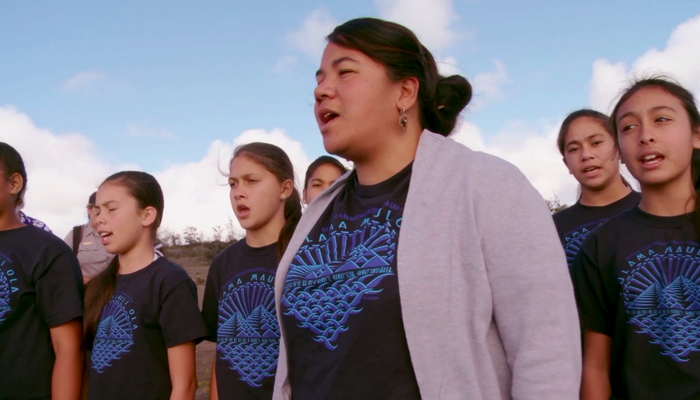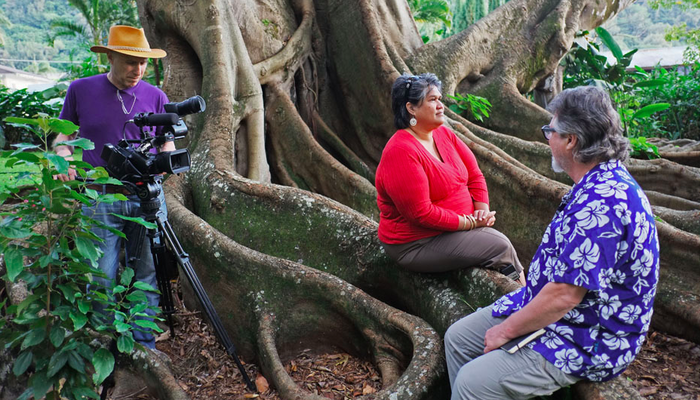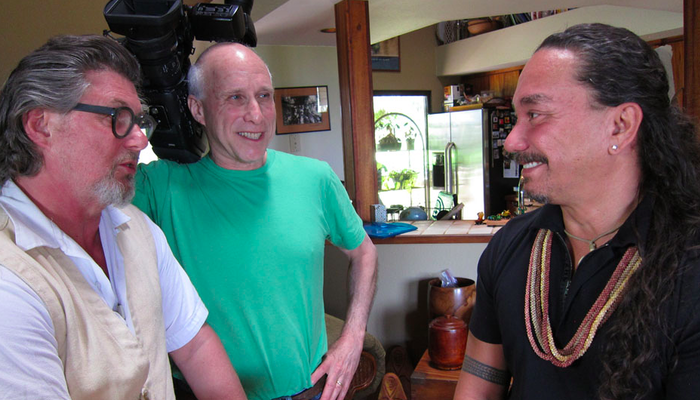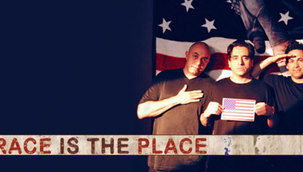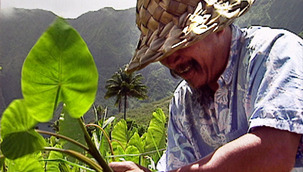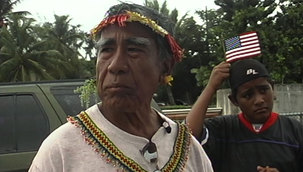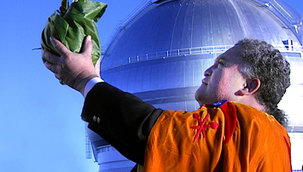
Language Matters with Bob Holman
What do we lose when a language dies?
- Filmmaker(s)
- David Grubin
- Category
- Full-Length Film
- Currently On-Air
- Subject Matter
- History, Culture, Politics & Government
- Featured In
- 25 in 25
- Region
- Polynesia
- Length
- 120 Minutes
- Year
- 2014
- Website
- www.languagemattersfilm.com
This two-hour documentary asks: What do we lose when a language dies? What does it take to
save a language? Written, produced, and directed by award-winning filmmaker David Grubin and hosted by poet Bob Holman, the program travels to a remote island off the coast of Australia where 400 Aboriginal people speak 10 different languages, all at risk; to Wales, where Welsh, once in danger, is today making a comeback; and to Hawaiʻi, where Hawaiians are fighting to save their native language. Grubin says: “Most people in the world speak more than one language—monolingualism is a recent phenomenon. We’re really celebrating diversity, looking at the vast domains of creativity, knowledge and thought encoded in language and what is lost when a language disappears.”
Divided into three acts, act three focuses on the Hawaiian language:The Hawaiian language was connected to everything… whether it was the name of a wind, a whispering sea, a rain that fell, a star that streaked across the sky… These things all connected you to place and were filled with spirit... And the moment that we severed their ability to speak their language, we separated them from a knowledge. From a spirit. From an identity, who they are as a people.
Kepā Maly
Lanai Culture and Heritage CenterThe struggle to preserve one of the world's most mellifluous, subtle, and elegant languages is front and center in the program's last act. ʻŌlelo Hawaiʻi, a language once spoken by hundreds of thousands of people, was nearly wiped out after Hawaiʻi became a territory of the United States in 1898: Hawaiian was banned from schools and English became the official language of government. In 1983, fewer than 50 children spoke Hawaiian. But a small group of educators were determined to do something about it.
They began by creating language immersion schools for pre-kindergarten children. They called them punana leos - language nests. The punana leos soon evolved into pre-Kindergarten through 12th grade schools, where every subject was taught in Hawaiian. On the Big Island, Bob visits one of the largest and most comprehensive, Ke Kula ʻO Nāwahīokalaniʻōpuʻu, or Nāwahi, a school with 300 children from pre-K through high school. If Hawaiian has survived into the 21st Century, it is because of Hawaiian schools like Nāwahī. Bob talks to Nāwahī principal Kauanoe Kamanā, language activist Professor Larry Kimura, and one of the first punana leo teachers, Lolena Nicholas. Lolena grew up on the island of Niʻihau where a small Hawaiian population continued speaking Hawaiian in daily life and could teach children with the ease of a native speaker.
Hawaiian is a poetic language, and like all poetry, its words resonate with subtle nuances and buried layers of history. As Kepā Maly, the director of the Lānaʻi Cultural and Heritage Center explains, Hawaiian words evoke centuries-old connections between the Hawaiian people and the natural world. There are hundreds of names for the rain and wind. Puakea Nogelmeier, a Hawaiian language activist and professor at the University of Hawaiʻi at Mānoa elaborates, as he gives Bob a lesson in Hawaiian: “It takes a different mindset to step into speaking Hawaiian. You have to come into a different world view.”
Most everyone has seen hula, but few people know that hula is in fact an extension of the Hawaiian language. Hawaiians dance hula to a mele, a chant. Kealiʻi Reichel, singer, songwriter, and hula master explains: “Hula cannot exist without the chant. It is one of the very few dance forms that require words.” Nowhere is the Hawaiian spoken word more powerfully felt than in the mele. As Hawaiian has grown stronger, chanting has grown strong along with it.
If words reflect and shape our experience of the world, what happens when words are lost? Former American poet laureate and twice winner of the Pulitzer Prize, WS Merwin has lived on the island of Maui for decades, and is deeply concerned with both the natural world and endangered languages. Merwin tells Bob: “As language dies away in culture after culture, the connection with the meaning goes. And when that goes you can never bring it back. When we lose [a language], we’re losing part of ourselves.”
If a language is going to survive, children have to speak it. But to enroll your children in an Hawaiian immersion school is a huge commitment, as Kauʻi Sai-Dudoit, Director of the Hawaiian Language Newspaper Archive, tells Bob: “What I heard a lot was, ‘Why are you doing that? They're not going to make a living out of that.’ But it's not the reason I put them there. I put them there to learn the language of their ancestors so they would have an easier time understanding who they were. For their identity… But when only 5% of us - or 2% or whatever some measly percent of us speak this language, we are far from out of the woods. We are so far from out of the woods yet.”
With languages all over the world in danger of extinction, Bob concludes by reflecting on language and its profound connection to our humanity: “Just as the physical ecology of the earth depends on a healthy interaction among plants and animals, many endangered, there is an ecology of consciousness, an interdependence of knowledge, culture and wisdom we find in and through our languages. Language is a lens through which we see the world. Through language, we become more fully ourselves.”
Bob Holman, Poet and Host
Bob Holman is a leader of the spoken word poetry movement including slam and hiphop poetries. Holman has taught at Columbia, NYU, Bard, Naropa, and The New School, and is founder of the downtown New York spoken word mecca, the Bowery Poetry Club. For years he has been a public poet in the oral traditions of the skaldic bards, Homeric warblers, and West African griots, while publishing/editeding sixteen books, including Sing This One Back to Me (Coffee House), A Couple of Ways of Doing Things (a collaboration with Chuck Close), American Book Award winner Aloud!: Voices from the Nuyorican Poets Cafe (co-editor), and Crossing State Lines: An American Renga (coeditor).
Holman is a proponent of poetry-media collaborations: he produced five seasons of “Poetry Spots” for WNYC-TV, winning three Emmys, and his five-part PBS series, The United States of Poetry, which won an INPUT (International Public Television) Prize. He was the host of MTV’s “Spoken Word Unplugged,” appeared on “HBO Def Poetry Jam,” and created the first major spoken word record label, Mouth Almighty/Mercury. In preparation for “Language Matters,” he spent two months in West Africa filming the West African griot traditions, spending time with Toumani Diabate and Vieux Toure, and the Tuareg and Dogon tribes. He is co-director of the Endangered Language Alliance. After the show premieres on PBS, the plan is for Bob to tour the globe in support of local language activists.
David Grubin, Producer and Director
David Grubin is a director, writer, producer, and cinematographer who has produced over 100 films, ranging across history, art, poetry, and science, winning every award in the field of documentary television, including two Alfred I. Dupont awards, three George Foster Peabody prizes, five Writer’s Guild prizes, and ten Emmys.
His biographies for the PBS series American Experience – Abraham and Mary Lincoln: A House Divided; LBJ; Truman; TR: The Story of Theodore Roosevelt; and FDR – have set the standard for television biography. His fivepart series for PBS – Healing And The Mind with Bill Moyers – has won many awards, and the companion book, for which he was executive editor, rose to number one on The New York Times Best Sellers list, remaining on the list for 32 weeks. His award-winning independent feature film Downtown Express has been screened at festivals in America and abroad. His other films include: The Buddha, The Trials of Robert Oppenheimer, The Jewish Americans, The Secret Life of the Brain, Young Doctor Freud, The Mysterious Human Heart, and Napoleon.
Grubin has received a Guggenheim Fellowship, has been a Montgomery Fellow at Dartmouth College, and is the recipient of an honorary doctorate from his alma mater, Hamilton College. A former chairman of the board of The Film Forum, he is currently a member of the executive committee of the Society of American Historians, and sits on the board at Poets House. Grubin has taught documentary film producing in Columbia University’s Graduate Film Program, and has lectured on filmmaking across the country.
Credits:
Director/Producer/Writer: David Grubin; Executive Producers: David Grubin and Bob Holman; Executive Producer for PIC: Leanne K. Ferrer; Conceived by: Bob Holman; Editor: Deborah Peretz; Cinematography: James Callanan and Bob Richman; Director of Motion Graphics: Brian Oakes; Associate Producer: Oliver Grubin.Funders Credits:
Language Matters is a co-production of David Grubin Productions Inc. and Pacific Islanders in Communications. Produced in association with The Endangered Language Alliance. Major funding provided by the National Endowment for the Humanities with additional funding provided by the Corporation for Public Broadcasting, the Arthur Vining Davis Foundations, the National Endowment for the Arts, and philanthropic individuals.
.
FOR FURTHER INFORMATION, INTERVIEWS, PHOTOS contact MartinMPR:
Susan Martin / susan@martinmpr.com / 505 685 4664 or Norma Kelly / norma@martinmpr.com / 818 509 0575

